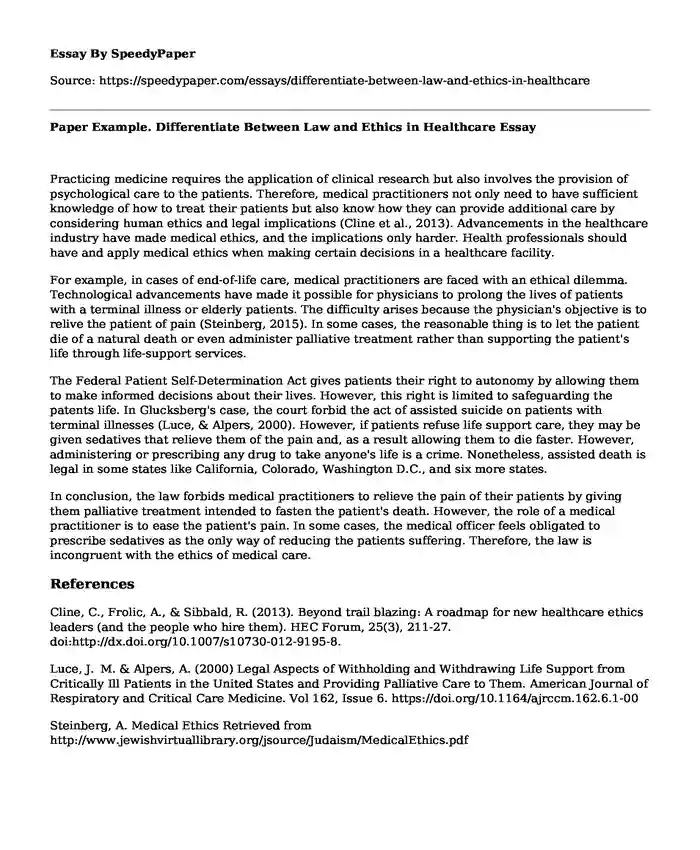
| Essay type: | Compare and contrast |
| Categories: | Law Medicine Ethical dilemma |
| Pages: | 2 |
| Wordcount: | 439 words |
Practicing medicine requires the application of clinical research but also involves the provision of psychological care to the patients. Therefore, medical practitioners not only need to have sufficient knowledge of how to treat their patients but also know how they can provide additional care by considering human ethics and legal implications (Cline et al., 2013). Advancements in the healthcare industry have made medical ethics, and the implications only harder. Health professionals should have and apply medical ethics when making certain decisions in a healthcare facility.
For example, in cases of end-of-life care, medical practitioners are faced with an ethical dilemma. Technological advancements have made it possible for physicians to prolong the lives of patients with a terminal illness or elderly patients. The difficulty arises because the physician's objective is to relive the patient of pain (Steinberg, 2015). In some cases, the reasonable thing is to let the patient die of a natural death or even administer palliative treatment rather than supporting the patient's life through life-support services.
The Federal Patient Self-Determination Act gives patients their right to autonomy by allowing them to make informed decisions about their lives. However, this right is limited to safeguarding the patents life. In Glucksberg's case, the court forbid the act of assisted suicide on patients with terminal illnesses (Luce, & Alpers, 2000). However, if patients refuse life support care, they may be given sedatives that relieve them of the pain and, as a result allowing them to die faster. However, administering or prescribing any drug to take anyone's life is a crime. Nonetheless, assisted death is legal in some states like California, Colorado, Washington D.C., and six more states.
In conclusion, the law forbids medical practitioners to relieve the pain of their patients by giving them palliative treatment intended to fasten the patient's death. However, the role of a medical practitioner is to ease the patient's pain. In some cases, the medical officer feels obligated to prescribe sedatives as the only way of reducing the patients suffering. Therefore, the law is incongruent with the ethics of medical care.
References
Cline, C., Frolic, A., & Sibbald, R. (2013). Beyond trail blazing: A roadmap for new healthcare ethics leaders (and the people who hire them). HEC Forum, 25(3), 211-27. doi:http://dx.doi.org/10.1007/s10730-012-9195-8.
Luce, J. M. & Alpers, A. (2000) Legal Aspects of Withholding and Withdrawing Life Support from Critically Ill Patients in the United States and Providing Palliative Care to Them. American Journal of Respiratory and Critical Care Medicine. Vol 162, Issue 6. https://doi.org/10.1164/ajrccm.162.6.1-00
Steinberg, A. Medical Ethics Retrieved from http://www.jewishvirtuallibrary.org/jsource/Judaism/MedicalEthics.pdf
Cite this page
Paper Example. Differentiate Between Law and Ethics in Healthcare. (2023, Sep 18). Retrieved from https://speedypaper.net/essays/differentiate-between-law-and-ethics-in-healthcare
Request Removal
If you are the original author of this essay and no longer wish to have it published on the SpeedyPaper website, please click below to request its removal:
- Free Essay Comprising the Arguments on Elderly Cancer Treatment
- Essay Example on Why Gun Control Laws Should Be Increased
- Essay Example on Post-traumatic Stress Disorder in Pregnancy
- Ethical Dilemma Case Study Related to the Ads with Gay and Lesbian Inclusion
- Essay Sample on Benefits of Microcirculation
- Cardiovascular Complications: Prevalence & Prevention - Essay Sample
- Empowering Diabetes Patients Through Effective Education and Communication - Essay Sample
Popular categories




